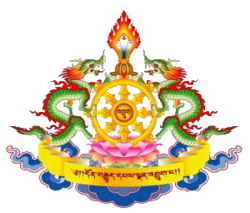Drukpa Kagyü: Difference between revisions
Yeshedorje (talk | contribs) mNo edit summary |
Yeshedorje (talk | contribs) |
||
| Line 6: | Line 6: | ||
The Drukpa Kagyü lineage is generally considered to have “Four Pillars”, the four following major incarnation lineages: | The Drukpa Kagyü lineage is generally considered to have “Four Pillars”, the four following major incarnation lineages: | ||
*[[Gyalwang Drukpa Incarnation Line]] | *[[Gyalwang Drukpa Incarnation Line]] | ||
*Drukpa Yongdzin | *Drukpa Yongdzin Incarnation Line | ||
*[[Garje Khamtrul Incarnation Line]] | *[[Garje Khamtrul Incarnation Line]] | ||
*Choegon Rinpoche Incarnation Line | *Choegon Rinpoche Incarnation Line | ||
Revision as of 12:21, 5 June 2014

Drukpa Kagyü (Wyl. ‘brug pa bka brgyud) is one of the subschools of the Kagyü tradition and the dominant religious tradition in Bhutan. The founder of the Drukpa Kagyü lineage is either said to be Lingje Repa Pema Dorje (1128-1188), or his principal disciple, Tsangpa Gyare Yeshe Dorje (1161-1211), the first Drukchen Rinpoche. Among the great masters of this school are the mahasiddha Götsangpa Gönpo Dorje (1189-1258) and the renowned scholar, meditator and historian, known as the omniscient Pema Karpo (1527-92).
The lineage acquired the name Drukpa in the twelfth century when, in 1206, Tsangpa Gyare Yeshe Dorje saw nine dragons fly up into the sky from the ground of Namdruk, and he named his lineage "Drukpa", or "Lineage of the Dragons" after this auspicious event. In this way, Tsangpa Gyare could be said to be the founder of the Drukpa Kagyü lineage.
Main Incarnation Lineages
The Drukpa Kagyü lineage is generally considered to have “Four Pillars”, the four following major incarnation lineages:
- Gyalwang Drukpa Incarnation Line
- Drukpa Yongdzin Incarnation Line
- Garje Khamtrul Incarnation Line
- Choegon Rinpoche Incarnation Line
Further Reading
- Dan Martin. 'Gling-ras-pa and the Founding of the 'Brug-pa School' in The Tibet Society Bulletin. 13 (June 1979) 55-69.
- E. Gene Smith, 'Padma dkar po and His History of Buddhism' in Among Tibetan Texts, Boston: Wisdom, 2001